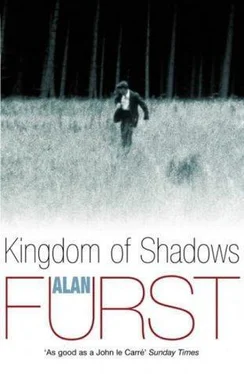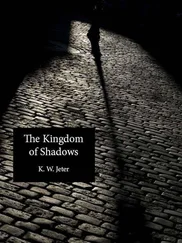Alan Furst - Kingdom of Shadows
Здесь есть возможность читать онлайн «Alan Furst - Kingdom of Shadows» весь текст электронной книги совершенно бесплатно (целиком полную версию без сокращений). В некоторых случаях можно слушать аудио, скачать через торрент в формате fb2 и присутствует краткое содержание. Жанр: Шпионский детектив, на английском языке. Описание произведения, (предисловие) а так же отзывы посетителей доступны на портале библиотеки ЛибКат.
- Название:Kingdom of Shadows
- Автор:
- Жанр:
- Год:неизвестен
- ISBN:нет данных
- Рейтинг книги:5 / 5. Голосов: 1
-
Избранное:Добавить в избранное
- Отзывы:
-
Ваша оценка:
- 100
- 1
- 2
- 3
- 4
- 5
Kingdom of Shadows: краткое содержание, описание и аннотация
Предлагаем к чтению аннотацию, описание, краткое содержание или предисловие (зависит от того, что написал сам автор книги «Kingdom of Shadows»). Если вы не нашли необходимую информацию о книге — напишите в комментариях, мы постараемся отыскать её.
Kingdom of Shadows — читать онлайн бесплатно полную книгу (весь текст) целиком
Ниже представлен текст книги, разбитый по страницам. Система сохранения места последней прочитанной страницы, позволяет с удобством читать онлайн бесплатно книгу «Kingdom of Shadows», без необходимости каждый раз заново искать на чём Вы остановились. Поставьте закладку, и сможете в любой момент перейти на страницу, на которой закончили чтение.
Интервал:
Закладка:
“Please.”
The clear liquor came exactly to the rim.
“Will you join me?”
The barman poured himself a vodka and raised his glass. “To poor shooting, I guess.” He drank in the Russian manner-with grace, but all gone.
From the nightclub tables, rhythmic clapping, growing louder as the patrons grew bolder, some of them yelling “Hey!” on the beat. The male dancer, squatting on the stage with his arms folded across his chest, was kicking his legs out.
“Passports,” the barman said, suddenly gloomy. “You can get into real trouble, fooling with that. They lock you up, here, if they catch you. It goes on, of course, mostly among the refugees, the Jews and the political exiles. Once you get run out of Germany, you aren’t legal anywhere, unless you’ve got a visa. That takes time, and money-you can’t afford to be in a hurry. But you are-with the Gestapo after you, you have to do whatever it takes. So you sneak out. Now, you’re a ‘Stateless Person.’ You slip into Czechoslovakia or Switzerland, hide out for a week if you know the right rooming house, then they catch you and send you across the Austrian border. After a week or two in jail, the customs officers walk you back across the frontier, at night, in the woods, and the whole thing starts again. Here it’s a little better. If you stay out of trouble, the flics don’t care that much, unless you try to work.” He shook his head slowly, in sorrow.
“How did you manage?”
“Nansen. We were lucky. Because we were the first wave, we got the League of Nations passports, we got the work permits, we got the jobs the French didn’t want. That was 1920 or so. Revolution over, civil war winding down, then the Cheka comes around-‘We hear you were a friend of Ivanov.’ So, time to run. Next, when Mussolini’s boys got to work, came the Italians. Their luck was pretty much the same as ours-you used to be a professor of theoretical physics, now you’re a real waiter. Now, thank God you’re a waiter. Because, starting in ‘33, here come the Germans. They have passports, most of them, but no work permits. They peddle, sell needles and thread from little suitcases on the boulevards, work the tourists, starve, beg, sit in the offices of the refugee organizations. It’s the same for the Spaniards, running from Franco, and now we’re getting the Austrians. No papers, no work permits, no money.”
“This friend, Boris, has money.”
The barman had known that all along. After a time he said, “You’re a detective, right?”
“With my accent?”
“Well, maybe you are, maybe you aren’t. Either way, I’m not the man you want. You have to go where the refugees are, to the Cafe Madine, the Grosse Marie, places like that.”
“A question? Personal question?”
“I’m an open book.”
“Why did you run?”
“Because they were chasing me,” he said, laughing again.
Morath waited.
“I was a poet. Also, to be honest, a criminal. When they came after me, I was never really sure which one it was.”
The Cafe Madine was in the 11th Arrondissement, just off the place de la Republique, between a butcher that sold halal meat to Arabs and kosher meat to Jews, and a repair shop for musical instruments called Szczwerna. It was easy, maybe too easy, to make contact at Madine. He showed up in the late afternoon, stood at the counter, ordered a beer, stared out at the throbbing street life of the quarter. A man tried to sell him a ring, Morath looked it over-he was there to buy, let them see a buyer. A small, red stone set in gold, University of Heidelberg, 1922.
“How much?”
“Worth three hundred, more or less.”
“I’ll think about it. Actually, I’m here because a friend of mine in Paris lost his passport.”
“Go to prefecture. ”
From Morath a look, if only one could. “Or?”
“Or nothing.”
Back the next day. Ten in the morning, deserted, silent. A shaft of sunlight, a sleeping cat, the patron wore his glasses down on his nose. He took his time with Morath’s cafe au lait, there was no skin on the boiled milk, the coffee was powerful and fresh, and he sent his little boy off to the bakery to get fresh bread for a tartine.
The contact was a tough old bird, once upon a time a timber merchant in the Ukraine, though Morath had no way of knowing that. He tipped his hat, asked Morath to join him at a table. “You’re the fellow with the passport difficulties?”
“Friend of mine.”
“Naturally.”
“What’s the market like, these days?”
“Seller’s market, obviously.”
“He needs the real thing.”
“The real thing.” Maybe in other times he would have found it funny enough to laugh at. Morath got it, he thought. Borders, papers, nations -made-up stuff, politicians’ lies.
“As much as possible.”
“A man who buys the best.”
Morath agreed.
“Twenty-five hundred francs. A figure like that scares you, perhaps.”
“No. For good value, you pay.”
“Very reasonable, this gentleman.” He spoke to an invisible friend.
Then he told Morath where to be, and when.
Two days later, now it was Friday. A busy afternoon at the Louvre. Morath had to work to find the right room-up the stairs here in order to go down the stairs there, past Napoleon’s swag from Egypt, past rooms of small, puzzling Roman things, around a corner and down an endless corridor of British schoolboys. At last, the room with the Ingres portrait. A luminous nude, seated at a table, her back curved and soft.
A man rose from a bench against the wall, smiled, and spread his hands in welcome. He knew who Morath was, had probably looked him over at the cafe. A handsome gentleman, portly, with a Vandyke beard and a tweed suit. Something like, Morath thought, the owner of a prosperous art gallery. He had, apparently, a colleague, standing on the other side of the room and staring at a painting, hands clasped behind his back. Morath saw them exchange a glance. White as chalk, this man, as though missing a lifelong beard, he wore a black homburg set square on a shaved head.
The man who looked like an art dealer sat next to Morath on the wooden bench. “I’m told that you are seeking a document of the finest quality,” he said. He spoke French like an educated German.
“I am.”
“That would be a corpse.”
“All right.”
“You are buying from the family of the deceased, naturally, and they will want twenty-five hundred francs. For our work, for the change of identity, it is another thousand francs. Can we agree?”
“Yes.”
The art dealer opened a newspaper, revealing a report of a polo match in the Bois de Boulogne and a passport in a cardboard folder. “The family wishes to sell immediately. The nationality of the passport is Roumanian, and has seventeen months to run.” The head in the identification photograph was of a man in middle years, formal, self-satisfied, his dark mustache carefully clipped and groomed. Below it, the name Andreas Panea.
“I will pay you now, if you like.”
“Half now. Half when we give you the finished product. Your photo goes in place of the deceased, the raised lettering on the photo is provided by the technician. The physical description is washed out and your own put in. The one thing that can’t be changed is the place of birth-that’s on the seal. So, the bearer of the document will be called this name, is of Roumanian nationality, and was born in Cluj.”
“What happened to him?”
The art dealer stared for a moment. Why are you concerned with that? Then he said, “Nothing dramatic.” And, a moment later, “He came to the end of caring. It is quite common.”
Читать дальшеИнтервал:
Закладка:
Похожие книги на «Kingdom of Shadows»
Представляем Вашему вниманию похожие книги на «Kingdom of Shadows» списком для выбора. Мы отобрали схожую по названию и смыслу литературу в надежде предоставить читателям больше вариантов отыскать новые, интересные, ещё непрочитанные произведения.
Обсуждение, отзывы о книге «Kingdom of Shadows» и просто собственные мнения читателей. Оставьте ваши комментарии, напишите, что Вы думаете о произведении, его смысле или главных героях. Укажите что конкретно понравилось, а что нет, и почему Вы так считаете.












